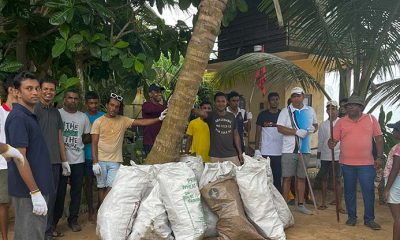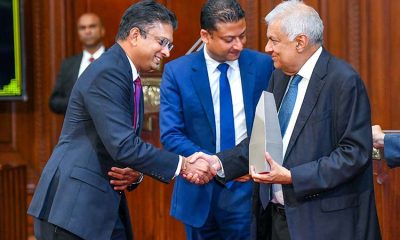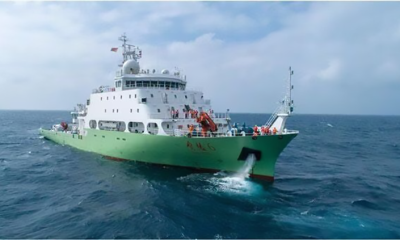Midweek Review
SLC, cryptocurrency and repealing of time-tested law
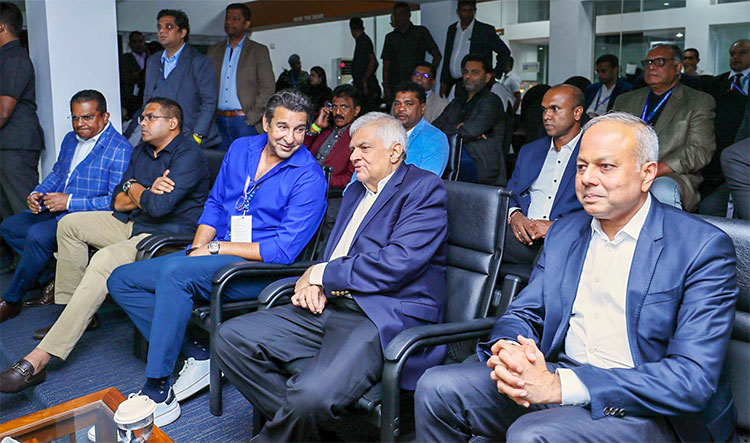
By Shamindra Ferdinando
Justice Minister Dr. Wijeyadasa Rajapakse, PC, declared in Parliament that the winners of LPL (Lanka Premier League) 2023 B-Love Kandy had been sponsored by an enterprise that was banned in the country.
The statement was made in Parliament on 24th August. The one-time President of the Bar Association found fault with SLC (Sri Lanka Cricket) for involving B-Love Network banned here over promoting cryptocurrency.
Unfortunately, by the time the Justice Minister made the declaration President Ranil Wickremesinghe had attended the final of the LPL 2023 at the R. Premadasa Stadium on Sunday (20 Aug.). The President was accompanied by Tourism and Lands Minister Harin Fernando and Senior Advisor on National Security Sagala Ratnayake.
Among those present were senior SLC officials, including President of the Board Shammi Silva, under investigation by the National Audit Office (NAO) over extravagant spending of over Rs 67 million by the SLC for its officials, family members and friends to watch the T20 World Cup tournament played in Australia (Oct. 09-Nov. 13, 2022) and a spate of other allegations.
In the absence of Wanindu Hasaranga, Angelo Mathews led B-Love Kandy to victory over Dambulla Aura, led by Kusal Mendis.
Dr. Rajapakse told The Island that he firmly stood by what he said in Parliament regarding the LPL being a gambling den. All those who had been involved in gambling/betting, as well as promoting cryptocurrency, but accommodated in LPL, were named in Parliament, and it would be the responsibility of the powers that be to take tangible measures against the SLC, the one-time Chairman of the Committee on Public Enterprises (COPE) stressed.
“I was also invited to witness the final but didn’t attend for obvious reasons,” Minister Rajapakse said, adding that “the LPL 2023 should be thoroughly investigated, particularly against the backdrop of the NAO investigation.” The Minister recalled the SLC fared very badly before the parliamentary watchdog committee over a period of time.
However, to be fair by the sponsor, it would be pertinent to mention that Kamal Faridi, the CEO of B-Love Kandy, in an exclusive interview with Ada Derana, posted on 24 July, 2023, quite clearly referred to their role in promoting cryptocurrency.
When asked to describe the B-Love network, Faridi declared: “B-Love Network is a community of people who hold crypto coins. They are one of the main sponsors of the Kandy team and are passionate about sports and cricket.”
Faridi said that they secured the franchise of the Kandy team for a period of 10 years. The top spokesperson is on record as having said that they bought the most expensive team in the LPL without negotiations. Financier Omar Khan is the owner of B-Love Kandy, formerly Kandy Falcons, Kandy Warriors and Kandy Tuskers. B-Love Kandy is coached by legendary Pakistan cricketer Javed Miandad whereas other big names included Wasim Akram.
The Justice Minister said that the SLC owed an explanation. Sports Minister Roshan Ranasinghe couldn’t absolve himself of responsibility by simply declaring that he was not consulted by the SLC. The Minister should inquire into this matter without further delay. The Central Bank and the Monetary Board, too, should look into the issues at hand as a bankrupt country couldn’t continue to flout laws of the land.
It must be noted that the Central Bank daylight robberies that were staged as far back as 2015/16 have yet to be resolved and one of the chief architects of that robbery continues to be shielded by Singapore, even though he is a top fugitive here, but those at the highest echelons of the present regime continue to run to that city state at the drop of a hat for “consultations”. Mind you the same city state also tried to dump all its garbage here during that notorious Yahapalana regime. And there wasn’t a hum from our NGO quislings.
The disclosure of the SLC’s alliance with such enterprises would definitely attract the attention of the International Cricket Council (ICC), the Justice Minister stressed, pointing out that in terms of the recently passed Anti-Corruption law the SLC matter could be dealt with.
Lawmaker Rajapakse made a devastating attack on the SLC during the debate on NAO’s draft report on the 2022 tour of Australia. Interestingly, in spite of a prohibition order obtained from the Colombo District Court by SLC against SJB lawmaker Hesha Withana discussing the issue, the Opposition MP, however, flayed the cricket administration, using his parliamentary privilege. The Ratnapura District MP repeated allegations, based on the NAO report, regardless of the court directive, but the position taken by the Justice Minister astonished all. Such accusations couldn’t have been at a worse time for the SLC, under heavy fire over waste, corruption, irregularities and mismanagement at a time the country is experiencing severe economic difficulties.
A major controversy erupted during the opening ceremony of the LPL 2023 tournament when versatile singer Umara Sinhawansha distorted the national anthem. How much was Ms. Sinhawansha paid by SLC for her rendition of the national anthem? That, too, would come up for discussion once the LPL 2023 is subjected to a state audit.
However, the Justice Minister’s allegations are even far more damaging than the NAO report revelations as the former come under the purview of the Anti-Corruption Act.
Repealing of a time-tested Act
Who wanted to repeal Exchange Control Act No 24 of 1953? Did repealing that time-tested Act contribute to the collapse of the national economy in 2022? Dr. Wijeyadasa Rajapakse’s repeated accusations regarding the repealing of the 1953 Exchange Control Act should be thoroughly investigated as the President’s Counsel, too, had been a member of the Yahapalana government that enacted Foreign Exchange Act No 12 of 2017 at the expense of the 1953 law. The Justice Minister, in an interview with Hiru, a week ago, claimed that taking advantage of the law exporters have parked as much as USD 100 bn abroad while the country continued to struggle to meet its basic commitments.
It would be pertinent to discuss the circumstances under which the Yahapalana administration enacted the Foreign Exchange Act No 12 of 2017. In May 2017, the then President Maithripala Sirisena and Premier Ranil Wickremesinghe agreed on a mini-Cabinet reshuffle in the wake of two Treasury bond scams perpetrated in February 2015 and March 2016. Nine Cabinet Ministers and one State Minister were re-allocated fresh ministerial portfolios on the morning of 22 May, 2017. The most important and far- reaching decision in the reshuffle was the key exchange of portfolios between Finance Minister Ravi Karunanayake and Foreign Affairs Minister Mangala Samaraweera. Karunanayake received Foreign Affairs while Samaraweera got the Finance portfolio. In addition to Finance, Mangala Samaraweera received the Media Ministry. Within four months, Karunanayake resigned over corruption charges in respect of the bond scams.
It was the late Mangala Samaraweera who served as the Finance Minister when the Yahapalana government enacted the now controversial Finance Act of 2017 on 25 July, 2017. Of the 225-member Parliament, 94 voted for the Bill presented by Premier Ranil Wickremesinghe, whereas 18 voted against. A staggering 113 MPs skipped the vote. Among those who voted for the Bill were current members of the SJB. The SJB was formed by a breakaway faction of the UNP, in early 2020. Kabir Hashim and Dr. Harsha de Silva, members of the SJB economic team, were among those who voted for the Bill. Karu Jayasuriya, in his capacity as the Speaker, endorsed the Act.
In addition to safeguarding those who parked money overseas, the new law facilitated money laundering operations. In the 1953 Act section 23 regularized the foreign exchange transfers. That particular section dealt with those who sent money overseas but didn’t receive goods in terms of that transaction. But, the 2017 law conveniently omitted that. The writer intends to submit a RTI query to Parliament seeking the list of MPs who voted for the 2017 Foreign Exchange Act.
The UNP and SJB owed an explanation regarding the allegations made by Justice Minister Rajapakse. Dr. Rajapakse, too, should explain why he waited so long to raise his voice against the 2017 Exchange Control Act. The then Premier Wickremesinghe who presented that damaging Bill is the President now. The UNP leader also holds several other portfolios, including Finance and Defence. At the time the new law was brought in, Dr. Indrajith Coomaraswamy served as the Governor of the Central Bank, though the government didn’t consult him as regards the new law.
Several months ago, rebel SLPP lawmakers, Vasudeva Nanayakkara, Wimal Weerawansa and Udaya Gammanpila raised the grave injustice caused to the country by the highly questionable Act passed in 2017. Dr. Rajapakse, too, discussed this matter, both in and outside Parliament, several months ago. But, so far, the government hasn’t responded to the accusations pertaining to the 2017 Foreign Exchange Act. In responding to The Island query, Dr. Rajapakse said that he offered assistance to the relevant authorities to amend the law but didn’t receive the anticipated response. The bottom line is that the Parliament enacted an Act at the expense of overall national security and stability.
Shocking revelation at PSC
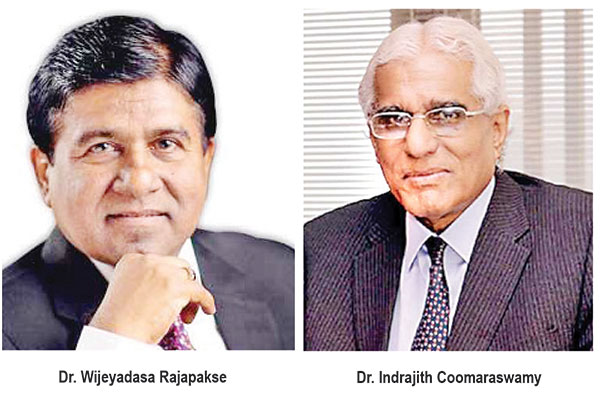 The Parliamentary Select Committee, assigned to investigate the 2019 Easter Sunday carnage, raised the Foreign Exchange Control Act of 2017, with the Central Bank, on 26 July, 2019. The CBSL team comprised the Governor of the Central Bank, Indrajit Coomaraswamy, Director of Financial Intelligence Unit, D.M. Rupasinghe, and Director of the Department of Supervision of Non-Bank Financial Institutions R.R. Jayaratne. Rupasinghe testified in-camera on a request made by Dr. Coomaraswamy. Dr. Coomaraswamy succeeded disgraced Singaporean, Arjuna Mahendran, in early July, 2016.
The Parliamentary Select Committee, assigned to investigate the 2019 Easter Sunday carnage, raised the Foreign Exchange Control Act of 2017, with the Central Bank, on 26 July, 2019. The CBSL team comprised the Governor of the Central Bank, Indrajit Coomaraswamy, Director of Financial Intelligence Unit, D.M. Rupasinghe, and Director of the Department of Supervision of Non-Bank Financial Institutions R.R. Jayaratne. Rupasinghe testified in-camera on a request made by Dr. Coomaraswamy. Dr. Coomaraswamy succeeded disgraced Singaporean, Arjuna Mahendran, in early July, 2016.
The CBSL set the record straight in response to then Power, Energy and Business Development Minister Ravi Karunanayake’s challenge. PSC member Karunanayake strongly countered CBSL condemnation of the Foreign Exchange Act of 2017. Commenting on funds received by the Batticaloa Campus Limited and the Heera Foundation from Saudi Arabia on seven and 15 occasions, respectively, the CBSL stressed that the new Act weakened the CBSL regulatory role, vis-a-vis illegal transactions. Those institutions were under investigations as regards the 2019 Easter Sunday attacks due to their links with the National Thowheed Jamaat (NTJ), blamed for those devastating attacks.
The PSC proceedings showed how politicians caused irreparable damage through unilateral actions. Ravi Karunanayake, who had been again brought back to the Cabinet, after the failed constitutional coup, in late 2018, clashed with the Central Bank over the enactment of the new law. The CBSL took an unwavering stand that the new law impeded its regulatory powers thereby facilitating illegal transactions.
Ravi Karunanayake (RK): Where does it say such transactions cannot be inquired into in terms of the new Act?
CBSL: In accordance with 2017 Exchange Control Act, Section 30, action cannot be taken.
RK: You prepared that Act. Why are you pretending as if you don’t know anything about it? CBSL amended it several times and sent it back.
Director of the Department of Supervision of Non-Bank Financial Institutions R.R. Jayaratne could have faced a ministerial onslaught if not for Dr. Coomaraswamy’s swift intervention. Had Dr. Coomaraswamy opted to remain silent, Jayaratne, probably would have had to suffer in silence unable to talk back to a powerful Minister
Dr. Coomaraswamy: No Sir. The Act actually was not drafted by us.
RK: Why not?
Dr. Coomaraswamy: No Sir. It was done outside. We were actually very upset about it. We were not included. That was drafted without the CBSL being involved. We were asked to comment on it
JVP MP Dr. Nalinda Jayatissa: If the Batticaloa Campus last received money in 2017, Hizbullah was aware of the new Act being drafted.
CBSL: Yes.
Nalinda Jayatissa: It could have happened.
CBSL: Present Act does not at least interpret what it meant by wrong. Unauthorized money transactions were taking place all over the country. Foreign currencies are kept illegally. Transactions do not come into the official banking system, not even one USD.
The exchange between Ravi Karunanayake and the CBSL erupted when lawmaker Ashu Marasinghe sought a clarification as regards the difference in the current and the previous Exchange Control Acts. The then Chairman of the Public Finance Committee M.A. Sumanthiran remained silent during the exchange between Ravi Karunanayake and the CBSL.
The circumstances of the Exchange Control Act that had been introduced was disputed by no less a person than the CBSL Governor. It would be pertinent to recall the advice given by Dr. Coomaraswamy to the electorate late 2018. Dr. Coomaraswamy issued the advice before President Maithripala Sirisena dissolved Parliament at midnight on 09 Nov., 2018, following the sacking of Premier Ranil Wickremesinghe.
Dr. Coomaraswamy’s statement, made before the Presidential Commission of Inquiry (PCol) on irregularities at SriLankan Airlines, SriLankan Catering and Mihin Lanka is relevant as Sri Lanka struggles to navigate difficulties. Dr. Coomaraswamy told the PCol that the country was facing a non-virtuous cycle of debt and it was a very fragile situation which could even lead to a debt crisis. “Of course my colleagues in the Debt Department have plans and capability to manage it. But it’s the duty of every citizen to act responsibly as regards the government policy,” he told the PCol. Dr. Coomaraswamy emphasized that people should elect MPs who were prudent enough to handle fiscal and monetary matters of the country. “I am not referring to any government, but it’s been the case ever since independence.”
In spite of knowing that the Exchange Control Act of 2017 is seriously flawed, political parties have done nothing so far to bring forth remedial measures, especially by those now wielding power. Perhaps the Committee on Public Finance should inquire into this. The Parliament should be ashamed of its failure to address this issue.
Lapses on the part of Parliament
The pathetic failure on the part of Parliament to deal with gold smuggling MP Ali Sabry Raheem (Puttalam District MP representing the Muslim National Alliance), for over five months, underscored the crisis the country is experiencing. Many an eyebrow was raised when the disgraced MP Raheem attended a meeting, chaired by President Ranil Wickremesinghe at the Presidential Secretariat,where ways and means of strengthening the gem and jewellery industry was discussed. Raheem was there as a member of the Sectoral Monitoring Committee on Environment, Natural Resources and Sustainable Development.
The Parliament owed an explanation why it couldn’t take action against the offending MP. The All Ceylon Makkal Congress (ACMC) that fielded Raheem on the MNA ticket, too, should be held responsible. The first time entrant, who was fined much less than any other offender after being caught with 3.3 kgs of gold and 91 smartphones valued at Rs. 74 mn and Rs. 4.2 mn, respectively, in late March this year, caused quite a stir when he voted in Parliament immediately after the disgraceful incident.
The President’s Office obviously failed in its basic responsibilities by inviting the culprit for a meeting with the President. But, the President’s appearance at the LPL final stressed that the ongoing controversy over massive financial irregularities didn’t matter at all. The question that must be popping up in the heads of most Lankans is are we being governed by baby faced bandits. Political party system continues to emphasize that regardless of whatever transgression, alleged wrongdoers can continue with impunity. There cannot be a better example to prove the shoddy way Parliament addressed issues of utmost importance than the gold smuggling’s MP’s affair.
The recent call by the Leader of the House Susil Premjayantha to summon MP Raheem before the parliamentary ethics committee, over five months after the incident at the BIA, must be nothing but another bid to side-step the issue.
Midweek Review
How Yahapalana project diminished SLFP, caused current impasse
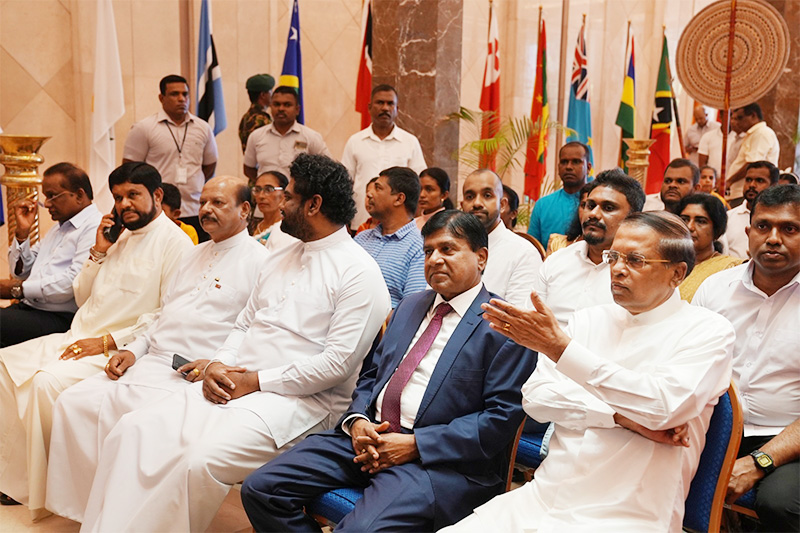
President Maithripala Sirisena dissolved Parliament in late June 2015 to save his Yahapalana partner UNP from the COPE (Committee of Public Enterprises) probe report on the first Treasury bond scam.
Having directed the then UPFA General Secretary Mahinda Amaraweera to lodge a complaint at the Commission to Investigate Allegations of Bribery or Corruption (CIABOC) soon after the media exposed the scam, President Sirisena quietly dissolved Parliament on the night of June 26, 2015, and called a General Election on August 17, 2015.
The then COPE Chief DEW Gunasekera is on record as having alleged that Sirisena dissolved Parliament to thwart him presenting the report on their findings. The Yahapalana leadership probably felt that had that happened it could have caused immense damage to the UNP campaign.
The obstruction caused by Sirisena, in late June 2015, and then declaration against the UPFA prime ministerial candidate in August 2015, exposed the SLFP leader. Sirisena plainly promoted the UNP at the expense of his own political party and those who accepted Cabinet portfolios and various other perks and privileges in terms of Sirisena’s agreement with the UNP cannot under any circumstances absolve themselves of the responsibility for the current crises. In addition, there were several SLFP State Ministers in the Yahapalana administration. The ruination of both the SLFP and the UNP was caused by Yahapalana policies and strategies. Perhaps, those interested in the issue at hand should undertake examination of facts and events leading to the destruction of two major political parties.
But can the Yahapalana lot explain to the country not just what they did with money obtained from two massive Central Bank bond scams, but what they did with USD 12.5 billion they borrowed at high interest from the international bond market and the one billion USD they got for the brand new Hambantota Harbour by renting it out to China on a 99-year lease. And how much did our comrades, who were hand in glove with that regime get for their share of theatrics?
By Shamindra Ferdinando
Maithripala Sirisena, in his capacity as the Yahapalana President and leader of the SLFP, resorted to an utterly irresponsible course of action in 2015.
Having won the 2015 presidential election, with the support of a UNP-led coalition that included the TNA and the JVP, the one-time SLFP General Secretary had no option but to fully cooperate with the UNP. President Sirisena bent over backwards to appease the members of the Coalition that ensured his victory. The TNA that once recognized the LTTE as the sole representative of the Tamil speaking people, delivered all Northern and Eastern electorates to Sirisena, on a platter.
The developing crisis in the SLFP, in the run-up to the presidential election later this year, cannot be examined without taking into consideration Sirisena’s unscrupulous actions during the Yahapalana administration before relations between the President and the UNP deteriorated, especially after the heavy setbacks the Yahapalana partners suffered at the Local Government polls in February 2018. By then, their relations had suffered irreparable damage and Sirisena was exploring ways and means of bringing Premier Ranil Wickremesinghe down to his knees.
At the time Sirisena switched his allegiance to Wickremesinghe, in late 2014, the then SLFP-led UPFA enjoyed a near 2/3 majority in Parliament, having won 144 seats, an increase of 39 seats at the April 2010 General Election since the previous parliamentary poll conducted in 2004. Today, under Sirisena’s faltering leadership, the SLFP parliamentary group consists of just 14 MPs. Of them, 12 had been elected on the SLPP ticket. with one appointed on the SLPP National List (Dr. Suren Raghavan) and only one elected on the SLFP ticket (Jaffna district lawmaker Angajan Ramanathan).
Sirisena, fighting on multiple fronts, has the backing of only one MP. Kegalle District MP Sarathi Dihsmantha Mithrapala seems to be the only lawmaker so far confident of Sirisena regaining control of the party against the backdrop of twice President Chandrika Bandaranaike Kumaratunga moving Court against the shackled SLFP leader. Sirisena’s move to bring in Justice Minister Dr. Wijeyadasa Rajapakshe, PC, too, has backfired with the contentious SLFP leadership row now beyond the hands of the various SLFP factions.
Former President Sirisena’s recent claims, regarding Indian involvement in the 2019 Easter Sunday carnage, has given a new dimension to the post-war developments here.
Having accused the Nimal Siripala-Mahinda Amaraweera led group, backed by Mrs. Kumaratunga of trying to align the SLFP with President Wickremesinghe’s UNP, Sirisena has surprised all by reaching a consensus with Justice Minister Dr. Rajapakshe on the post of Acting Chairman of the party. Sirisena had Dr. Rajapakshe elected in response to Mrs. Kumaratunga’s group naming Nimal Siripala de Silva as the Acting Chairman. Both Acting Chairmen, Nimal Siripala de Silva and Dr. Rajapakshe are members of Wickremesinghe’s Cabinet and the move on the part of SLFP factions to elect outsiders as Acting Chairmen seemed absurd.
Sajin Vass Gunawardena, who once wielded immense political clout as monitoring MP of the Foreign Affairs Ministry, during President Mahinda Rajapaksa’s second term, is now with Sirisena’s faction. The other post-war monitoring MP, the Rajapaksas appointed, was Duminda Silva, a former UNPer.
Bombshell declaration
Sirisena’s faction has repeatedly accused Mrs. Kumaratunga’s group of facilitating President Wickremesinghe’s political strategy.
Let us examine how Sirisena cooperated with the UNP, having betrayed the party in the run-up to the 2015 presidential poll. It would be pertinent to mention that Sirisena contested on the ‘Swan’ symbol of the New Democratic Front (NDF). Founded in 1995, it was originally called Democratic United National Lalith Front but renamed NDF in 2009. Since then, the then General Sarath Fonseka (2010), Maithripala Sirisena (2015) and Sajith Premadasa (2019) contested under that symbol and the possibility of incumbent President Ranil Wickremesinghe, too, choosing that party to contest forthcoming presidential poll cannot be ruled out.
A few days before the General Election, on August 17, 2015, President Sirisena’s office leaked a highly controversial letter. Therein, Sirisena, in his capacity as the SLFP leader, disclosed several issues he took up with the UPFA prime ministerial candidate Mahinda Rajapaksa.
The five-page letter emphasized whatever the outcome of the election, UPFA’s prime ministerial candidate Mahinda Rajapaksa wouldn’t be appointed Premier under any circumstances, even if that party won the General Election. There hadn’t been a similar warning issued by a President here or perhaps anywhere else that their own prime ministerial candidate wouldn’t be considered for the post. That statement was meant to discourage the UPFA block vote thereby giving a clear advantage to the UNP. That betrayal caused a debilitating setback. That was Sirisena’s intention. In other words, the SLFP leader wanted the UNP to win the election at the expense of his own party. But, Mrs. Kumaratunga and her associates wouldn’t dare take up that issue as at that time all of them cooperated with the UNP to defeat the Rajapaksas. That is the ugly truth.
Sirisena’s letter to Mahinda Rajapaksa, issued to the media on Aug 13, 2017, dealt with several issues and was written with the sole purpose of releasing it to the media, just ahead of the General Election. Inquiries made by the writer at that time, revealed that Mahinda Rajapaksa’s camp decided against releasing it to avoid any unfavourable fallout.
Having warned Mahinda Rajapaksa not to expect the premiership, Sirisena proposed that in case the party won the election, the party could pick a premier from among Nimal Siripala de Silva, John Seneviratne, Chamal Rajapaksa, Athauda Seneviratne, A.H.M. Fowzie, Susil Premjayantha and Anura Priyadarshana Yapa.
Sirisena urged Rajapaksa to publicly display his magnanimity to pave the way for the appointment of a new Premier. Sirisena claimed that he was able to help the SLFP retain the presidency by giving leadership to the growing Opposition movement against Mahinda Rajapaksa due to his (Sirisena’s) qualities and the faith the electorate had in the SLFP.
Sirisena also claimed that he averted a huge electoral rout by not calling parliamentary polls immediately after his triumph at the January 8, 2015, presidential poll. Sirisena found fault with Rajapaksa for contesting from the Kurunegala district, regardless of his (Sirisena’s) specific request not to contest as it would deprive the SLFP of the support of the Tamil speaking people, civil society and the middle class.
Interestingly, on the day Sirisena leaked his letter to Mahinda Rajapaksa, Premier Wickremesinghe addressed the media at the Sri Lanka Foundation where he explained how victory for the UNP-led National Front for Good Governance (UNFGG) could help consolidate the gains made at the presidential election. Premier Wickremesinghe reiterated his unwavering commitment to the continuation of the post-presidential polls arrangement with Sirisena.
In line with his overall strategy, immediately after the conclusion of the General Election, Sirisena unceremoniously removed 25 members of the SLFP Central Committee. At the behest of Sirisena, Colombo District UPFA candidate Prasanna Solangaarachchi secured an enjoining order from the Colombo District Court to prevent the convening of the decision-making CC. That move was meant to prevent convening of that body until the conclusion of the General Election. Subsequently, Duminda Dissanayake (now a key member of the Kumaratunga-led group) in his capacity as the Acting General Secretary of the SLFP, removed CC members as directed by Sirisena.
Regardless of Sirisena’s betrayal, the UNFGG couldn’t secure a simple majority. They obtained 106 seats, including 13 National List slots whereas the UPFA won 95 seats. The UPFA parliamentary group included 12 National List slots. In terms of the agreement between Sirisena and the UNP, the former offered the required support to form a government, thereby sharing the Cabinet portfolios. Sirisena’s despicable move divided the UPFA in Parliament.
Sirisena went a step further. The Yahapalana President and Premier offered the position of Leader of the Opposition to R. Sampanthan, the leader of the TNA, though it won only 16 seats, including two National List slots at the General Election.
Had Sirisena remained neutral, the outcome at the 2015 General Election could have been either different or extremely narrow. Sirisena also denied National List slots to those who had been supportive of Mahinda Rajapaksa and openly questioned the President’s declaration that he wouldn’t be considered for Premier, under any circumstances. Sirisena packed the UPFA National List with those who had been rejected by the people as he sought to consolidate his position, regardless of consequences.
SLFP-UNP pact
Both Sirisena and Wickremesinghe agreed that tangible measures were required to thwart any attempts by the Rajapaksas to stage a comeback. Sirisena appeared to have agreed that the Treasury bond scam, perpetrated in late February 2015, just a couple of weeks after his swearing in ceremony, shouldn’t undermine a far reaching agreement between the SLFP, the main constituent of the UPFA and the UNP. SLFP Duminda Dissanayake and UNP General Secretary Kabir Hashim (KH quit UNP in early 2020 and was elected on the SJB ticket at the last General Election) signed ten agreement on behalf of their respective parties at a ceremony held at the Presidential Secretariat on August 21, 2015. The agreement basically dealt with nine major issues and was in operation for a period of two years. Dissanayake and Hashim inked the agreement immediately after Wickremesinghe was sworn in as the Premier before Sirisena.
About eight months after the signing of the agreement, the powers that be perpetrated the second Treasury bond scam. Between the signing of the agreement (Aug 2015) and the second treasury bond scam (March 2016), the Yahapalana government betrayed the war-winning armed forces at the Geneva-based United Nations Human Rights Commission. That was unparalleled treachery and till now Sri Lanka has failed to take tangible measures to set the record straight.
The Aug 2015 agreement failed to have the desired results. In fact, the flawed Sirisena-Wickremesinghe strategy caused rapid deterioration of both political parties during the Yahapalana administration. Wickremesinghe’s efforts to retain the leadership finally led his Deputy Sajith Premadasa to split and contest the last General Election under the SJB ticket. The UNP that secured 106 seats at the August 2015 General Election was reduced to just one National List slot whereas Sajith Premadasa’s SJB obtained 54 seats, including seven National List slots. The UPFA didn’t even contest the last General Election as in its place emerged the SLPP (Pohottuwa party) that handsomely won the General Election but an explosive mixture of developments and external interventions caused its collapse, paving the way for Wickremesinghe to return to power under most unusual circumstances.
Ousted President Gotabaya Rajapaksa in ‘Conspiracy to oust me from the presidency’ ascertained that in the wake of the violent protest campaign, dubbed ‘Aragalaya,’ then Prime Minister Ranil Wickremesinghe was the only person capable of restoring the rule of law in the country.
In the chapter, titled ‘The Politics of Regime Change,’ in the recently launched memoirs that dealt with the circumstances leading to his ouster in July, 2022, Gotabaya Rajapaksa recognized the UNP leader as the ideal person to overcome, what he called, mob rule.
Developing crisis
The SLFP is in such turmoil, the belittled leadership is not in a position at least to organize a proper May Day rally today. Obviously, Sirisena may have not anticipated the Colombo District Court issuing injunctions against parachuted Acting Chairman Wijeyadasa Rajapakshe, while he continues to be Justice Minister in the present government after being elected on the SLPP ticket, and Acting General Secretary Sarathi Dushmantha.
The injunctions, effective until May 8, were issued after considering a case filed by Ministers Lasantha Alagiyawanna and Mahinda Amaraweera and MP Duminda Dissanayake.
On behalf of the plaintiffs, President’s Counsel Chandaka Jayasundara presented the facts to Court and stated that it is illegal and unconstitutional for the defendants to hold those positions.
The Court was told that Wijeyadasa Rajapakshe couldn’t hold the post of Acting Chairman as he was not a member of the SLFP and it is constitutionally illegal for a member of another party to hold a position in the SLFP.
In respect of Sirisena, courts have issued two orders preventing him from functioning as the Chairman of the party in violation of SLFP Constitution whereas Sirisena has moved Court against Minister Mahinda Amaraweera alleging that the Minister defamed him. Sirisena has demanded a staggering Rs 1 bn from one of his former associates. Responding to media queries, a cheeky Amaraweera has warned Sirisena of further disclosures. Sirisena seems to be in a bind literally facing nightmare after nightmare of his own making due to unbelievable acts of treachery he has perpetrated boomeranging on him. The beleaguered suspended SLFP leader is faced with a set of problems for which there seems to be no solution. Even if the courts, in respect of ongoing cases finally decided in his favour, the SLFP has suffered such devastating damage a full and quick recovery seems unrealistic.
The SLFP is in a true dilemma as to its future. With the Election Commission, in terms of the Constitution, empowered to make official announcements on presidential elections on or after July 17, the once formidable political party that had secured President’s Office on several occasions is not sure how to reach consensus on the presidential and parliamentary polls. Of the current parliamentary group, nearly a dozen seem to be with President Wickremesinghe, Dayasiri Jayasekera on his own and Sarathi Dushmantha Mithrapala declaring his support for Sirisena who is very much unlikely to get an opportunity to re-contest Polonnaruwa on the SLPP ticket again.
Midweek Review
University to serve common people or help increase profits?
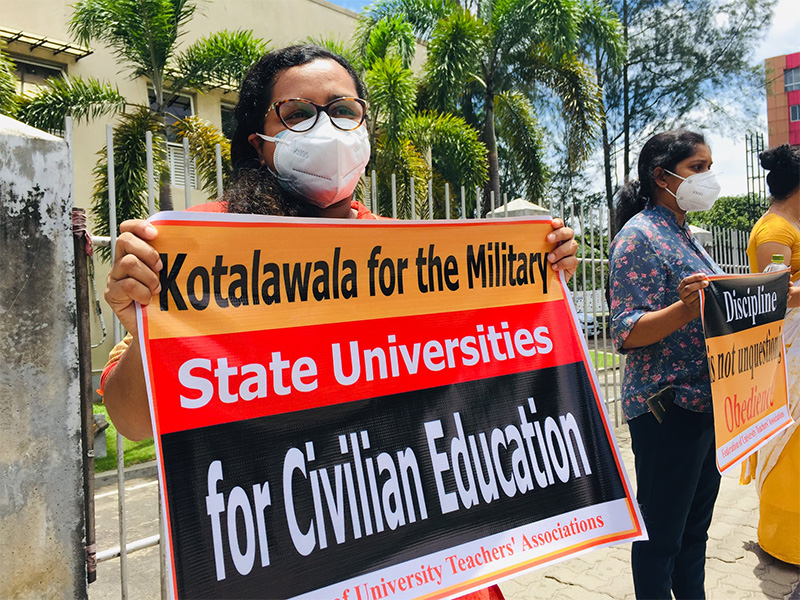
by Susantha Hewa
For many people in society, universities and academia remain a far-off entity with a certain halo, except when undergrads come to the streets to protest and confront the police. For all they (the common people) care, universities are there for those ‘smart students’ to receive higher education and get qualified for high salaried jobs. Few would dare ask whether universities have a more people-oriented role to play that would urge people to think of them as less unapproachable places.
Hasini Lecamwasam’s (HL) article “The case for a ‘university’”, which appeared in The Island of 16 April makes a strong case for narrowing down the existing gap between the universities and the general public by examining the smugly accepted and rarely questioned social, political and economic maxims that influence the processes of knowledge production in universities. In her opening sentence, HL comments on the universities’ aloofness from the common people. She says, “Any meaningful exercise in knowledge production centrally involves investigating the systems of thought that undergird our social, political, and economic arrangements, with a view to changing them to be better for more people.” She also critiques the ways in which market interests have been affecting our universities thus making them look more and more out-of-the-way.
Employable graduates
Market interests can be out of tune with academic interests, which would otherwise have been more attuned to societal needs. To take an example, let’s look at the trendy idea of university as a place for manufacturing “employable graduates”. “Why not?” one may ask. However, this seemingly reasonable question is far too narrowly premised often on focusing on the graduate’s career prospects with little concern for his due contribution to society or promoting the wellbeing of the taxpayers who have backed his education all the way. This questions the wisdom of an economy thriving on multiplying profits with little concern for the more fundamental question of aligning individual success more with the progress of the society than with boosting company’s profits. In fact, our education system, which has for decades been in congruence with a multilayered society based on wide income gaps and producing many social discontents, has to be objectively scrutinized; the sooner the better. If the personal goals of the individual had been made to be attainable through a more people-oriented education system that would have sufficiently appreciated the mutually-rewarding link between education and socio-economic stability, today’s crisis would have been more easily managed.
A good example of how market interests can tilt the scale of weightage given to subjects in favour of the business interests of the prospective employers can be found when you look at company priorities at job interviews. Companies prefer graduates with better English communication skills, despite their lower academic performance to those who have excelled in academic work but with no English language fluency to match. Surely, we can’t blame the companies whose interest lies not in academic excellence of whom they recruit, but in their fluency in English that can jack up their business. Why should they pay for the academic excellence of the candidates, if they can’t talk glibly to sell? On the part of the undergrads, why should they burn midnight oil to excel in academic work when the country cannot absorb them? Surely, their main concern is a well-paid job, a life of luxury and social recognition and all that glitz, which is reasonable in a consumerist society. In an economic environment where the most alluring aspect of education for the undergrads is made to be their future material prosperity rather than their aspirations being productively aligned with social wellbeing, the more sublime goals of education tend to become a bad joke. Bertrand Russell in his essay “Education” (Why men fight) says, “the economic machine holds them [students] prisoners”, and that it thwarts their finer impulses. He goes on to say, “… to all in some degree, education appears as a means of acquiring superiority over others; it is infected through and through with ruthlessness and glorification of social inequality”. Although Russell said so more than a century ago, his critique of misdirected education models has equal relevance in our own times.
Academia and ivory-tower
The word “academic” can be scary for a great number of people who have been denied the opportunity of higher education for different reasons. The word associates with all highbrow companions like scholastic, pedagogical, intellectual, erudite, cerebral, cultured, theoretical and philosophical. It also has another set of companions, like, for example, impractical, unrealistic, ivory-tower, irrelevant and suppositious, which are less imperious than the previous set. They inhabit another area of meanings which, more or less, revolve around the term “ivory-tower” – “a state of privileged seclusion or separation from the facts and practicalities of the real world”, as any dictionary has it. The Cambridge dictionary has the following sentence to illustrate its meaning: “Academics sitting in ivory towers have no understanding of what is important for ordinary people”. A bit embarrassing, isn’t it? However, there is no denying the fact that the word “academic” has for ages been regarded as highbrow, privileged and, more importantly, “aloof” from the common people, who earn a living “by the sweat of their brow”, as it were.
Can this aloofness be linked with an overdose of education they have received? Perhaps, this “privileged seclusion” or the aloofness of the academics is not so much the result of any ‘exalting’ education they have received as their long-accustomed pact with the prevailing social hierarchy, which espouses segregation and disregards everything that is not one’s immediate concern. Dr. Shashi Tharoor in his book, “India: from midnight to the millennium and beyond” says, “Very few Indians have a broader sense of community than that circumscribed by ties of blood, caste affiliation, or village”. This lack of empathy with those “others” outside one’s little circles of buddies connected by family ties, race, ethnicity, religion, etc., is not possibly limited to Indians, but common to all societies whose education, culture, politics and economy accept segregation and its corrosive social effects as natural and, worse, desirable. Dr. Tharoor has a quiet laugh when he writes further down about “The Indian [who] wades through dirt and filth, past open sewers and fly-speckled waste, to an immaculate home where he proudly bathes twice a day”. However, the barb can well be a critique of any society where personal interests and societal interests are perceived to inhabit separate lands. What is worthy of scrutiny is whether education can, among other things, be engineered to promote a culture that can help converge these seemingly disparate interests, which many would, unfortunately, consider as normal.
Exemplar of social equality
When a university education is primarily thought of as a way of securing a prestigious position in society, rather than getting an opportunity for pursuing one’s academic interests, the knowledge and skills gathered thereby for working for self-fulfillment, along with promoting social well-being, the result would be to produce an educated class, preoccupied with securing a slot in the profit-making machine. Rather than urging them to think of common wellbeing, it would estrange them from society and encourage them to revel in their ‘superiority’. Among the undergrads, this can be seen in its most brazen form in ragging where the seniors treat the new entrants like dirt (let’s not talk about torture), insisting them to be respected by the latter as “Their Highnesses” (Jyeshta Uttamayas). What is manifest in this is their subconscious acceptance and fusion with a culture of social stratification which rationalizes the coercive power of the “superiors”. One would have expected higher education to broaden the empathies of the scholars, but the charms of “superiority” seem to hold sway. It is open to discussion and debate whether or to what extent the “academic” pecking order reflects the convoluted hierarchies of the wider world.
Hence, the aptness of the concluding line of HL’s article in which she refuses to go with the crowd but, “continue to push agendas of critical research (likely without funding) and critical discussion in classrooms and outside (at the risk of penalisation) within universities”, so that it will ensure a wider and stronger social relevance of the universities.
Midweek Review
What a Frail Tree Tells

By Lynn Ockersz
The sapling of great promise,
Planted seven decades ago,
On a green growth model,
Hoping for the land’s denizens,
It’d be a protective canopy,
Alas, is wilting already in heat,
And giving up its precious sap,
To grasping, gangrenous hands,
So much so, instead of an Oak,
We are left with a withered palm.
-

 Business5 days ago
Business5 days agoSri Lanka Resorts of Cinnamon Hotels & Resorts mark Earth Day with impactful eco-initiatives
-

 Business6 days ago
Business6 days agoDialog Axiata recognised as the Most Significant FDI Contributor by BOI
-

 Business6 days ago
Business6 days agoUNESCAP Technical Cooperation Highlights Report flags significant strides in its partnership with Sri Lanka
-

 Business7 days ago
Business7 days agoComBank crowned ‘Best Bank in Sri Lanka’ by Global Finance for 22nd year
-

 Business7 days ago
Business7 days agoCinnamon Lakeside Colombo welcomes Nazoomi Azhar as its new General Manager
-

 News4 days ago
News4 days agoSri Lankan Oil and Gas exploration grinds to a standstill amid protracted legal battle
-

 News4 days ago
News4 days agoGerman research ship allowed Sri Lanka port call after Chinese-protest led clarification
-

 Editorial6 days ago
Editorial6 days agoShocks from Bills












